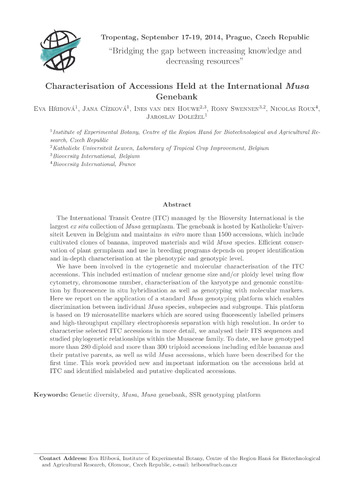Characterisation of accessions held at the International Musa Genebank
The International Transit Centre (ITC) managed by the Bioversity International is the largest ex situ collection of Musa germplasm. The genebank is hosted by Katholieke Universiteit Leuven in Belgium and maintains in vitro more than 1500 accessions, which include cultivated clones of banana, improved materials and wild Musa species. Efficient conservation of plant germplasm and use in breeding programs depends on proper identification and in-depth characterisation at the phenotypic and genotypic level. We have been involved in the cytogenetic and molecular characterisation of the ITC accessions. This included estimation of nuclear genome size and/or ploidy level using flow cytometry, chromosome number, characterisation of the karyotype and genomic constitution by fluorescence in situ hybridization as well as genotyping with molecular markers. Here we report on the application of a standard Musa genotyping platform which enables discrimination between individual Musa species, subspecies and subgroups. This platform is based on 19 microsatellite markers which are scored using fluorescently labelled primers and high-throughput capillary electrophoresis separation with high resolution. In order to characterize selected ITC accessions in more detail, we analyzed their ITS sequences and studied phylogenetic relationships within the Musaceae family. To date, we have genotyped more than 280 diploid and more than 300 triploid accessions including edible bananas and their putative parents, as well as wild Musa accessions, which have been described for the first time. This work provided new and important information on the accessions held at ITC and identified mislabeled and putative duplicated accessions.

